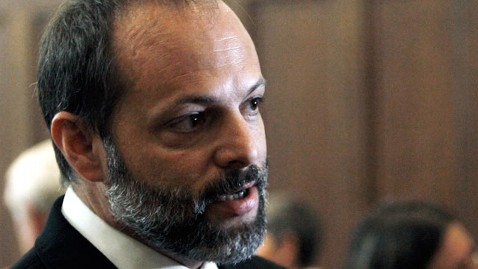The Man Behind Mississippi’s Abortion Debate

Rogelio V. Solis/AP Photo
On Nov. 8 Mississippi voters will decide whether a fertilized egg should be considered a “person,” a movement organized by Christian activist and “ part-time farmer and tractor salesman” Les Riley who chairs an organization advocating for constitutional rights.
Riley’s proposed amendment to Mississippi’s state constitution, Measure 26, would define personhood as “every human being from the moment of fertilization, cloning or the functional equivalent thereof.”
The conservative activist, who has 10 children, submitted the proposed initiative in 2009, gathering more than 100,000 signatures in support of the measure.
“The gay rights people say they’re the end of the civil rights movement — they’re it,” he said at a 2009 Tea Party rally where he plugged the petition. “The only people who don’t have civil rights in this country are the tiny people.”
“You cannot escape living in a religious society,” Riley told the crowd. During the speech he described President Barack Obama as a “boogeyman” and an “open socialist” and Bill Clinton as a “bad guy.”
The American Civil Liberties Union of Mississippi and Planned Parenthood filed a lawsuit, arguing that the amendment would modify the Bill of Rights by defining what a “person” is, but the Mississippi Supreme Court allowed the initiative to stay on the ballot.
During the 2009 rally, Riley thanked anti-abortion activist Cal Zastrow, someone who was working “fulltime” to get the personhood amendment on the ballot.
“When he’s not doing that he’s down at the abortion clinic counseling mothers and when he’s not doing that he’s smuggling Bibles into communist countries,” said Riley, who was not immediately available today for comment.
Zastrow has also volunteered with the personhood campaign in Colorado, which was defeated by voters twice.
In Mississippi, however, the measure appears to have more support.
Riley currently serves as chairman of the Mississippi Constitution Party, an organization that believes, “The sole purpose of government, as stated in the Declaration of Independence, is to secure our unalienable rights given us by our Creator. When Government grows beyond this scope, it is usurpation, and liberty is compromised.”
Even so, the “personhood” amendment would create additional governmental control.
The proposition’s website, YesOn26, says the amendment would “stop the abortion industry in Mississippi” even in cases of rape or incest, because “women who have borne a child conceived in rape testify that the baby is a blessing.”
It would also challenge the Roe v. Wade ruling, something Riley considers “ judicial tyranny.”
The 1973 Supreme Court decision was based on the Constitutional right to privacy in the Due Process clause of the Fourteenth Amendment of the U.S. Constitution.
Critics worry the vague wording of the “personhood” amendment would carry serious implications, creating a rationale for banning certain types of contraception or making doctors subject to criminal prosecution.
But Riley dismisses those concerns as just another example of the “ incredible opposition” posed by abortion rights advocates.
“[Pro-abortion groups] know Mississippi is among the most pro-life states & that we have put these convictions into action over the past two decades – closing six of the seven abortion mills that were in our state at one time,” Riley wrote in a 2010 article on website TheAmericanReview.com. “Now we only have one struggling abortion mill left in the state. Having worked to protect all children by love, we can now protect them again in law.”